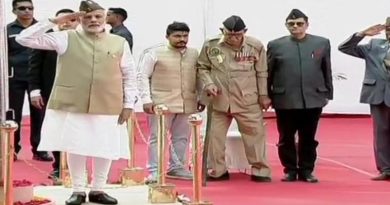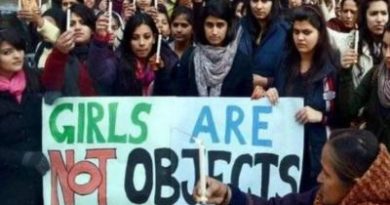PROTEST By DALITS Against SC Verdict On SC /ST Act Turned Violent: Govt Files Review Petition
DALLITS observed Bharat Bandh and took out protest marches at many places across India on Monday against the alleged dilution of the SC/ST Act, even as some state governments ordered closure of educational institutes, suspended bus services, and curtailed mobile and internet connectivity. On March 20, after taking note of the abuse of stringent provisions of the Schedule Caste and Schedule Tribe (Prevention of Atrocities) Act, 1989, the Supreme Court issued directions to ensure that innocent persons, particularly public servants, are not unnecessarily harassed. The Supreme Court on Monday declined an urgent hearing on a plea which sought a stay and review of the March 20 verdict on the SC/ST Act by which certain safeguards were put in place on automatic arrest of individuals. All India Federation of SC/ST organisations, a conglomerate of nearly 150 employee groups, said large-scale nationwide violence has taken place in which several people have lost their lives and therefore the petition should be heard urgently. A Bench of the apex court comprising Chief Justice Dipak Misra, justices A M Khanwilkar and D Y Chandrachud said that the petition will be heard in due course of time. Advocate Manoj Gaurkella, appearing for the employees’ federation, said that the verdict passed by the judgement 20 was “unfair and unjust and therefore it should be stayed”. He said that this writ petition should be heard by a larger Bench of five judges to decide the issue. The apex court had on March 20 said that on “several occasions”, innocent citizens were being termed as accused and public servants deterred from performing their duties, which was never the intention of the legislature while enacting the Scheduled Castes and the Scheduled Tribes (Prevention of Atrocities) Act.The top court had said that unless the exclusion of anticipatory bail is limited to “genuine cases and inapplicable to cases where there is no prima facie case was made out, there will be no protection available to innocent citizens”. It had said that “in view of the acknowledged abuse of law of arrest in cases under the Atrocities Act, arrest of a public servant can only be after approval of the appointing authority and of a non-public servant after approval by the Senior Superintendent of Police (SSP) which may be granted in appropriate cases if considered necessary for reasons recorded.” It also said that the reasons recorded must be scrutinised by the magistrate for permitting further detention. To avoid false implication of an innocent, the top court directed that a preliminary enquiry may be conducted by the DSP-rank officer to find out whether the allegations make out a case under the Atrocities Act and whether the allegations are not frivolous or motivated. The ruling came on a plea of Subhash Kashinath Mahajan, who while serving as the Director of Technical Education in Maharashtra government, was accused of refusing prosecution sanction against two senior officers of the department accused under SC/ST Act by a store keeper. Mahajan challenged the order of May 5, 2017, of the Bombay High Court which had refused to grant him anticipatory bail in the case and quash the FIR.“In view of acknowledged abuse of law of arrest in cases under the Act, arrest of a public servant can only be after approval of the appointing authority and of a non-public servant after approval by the SSP which may be granted in appropriate cases, if considered necessary, for reasons recorded. Such reasons must be scrutinised by the magistrate for permitting further detention,” a Bench of Justice AK Goel and Justice UU Lalit ordered. The recorded reasons must be served on the person to be arrested and to the court concerned, the Bench said. “As and when a person arrested is produced before a magistrate, the magistrate must apply his mind to the reasons recorded and further detention should be allowed only if the reasons recorded are found to be valid. The court said, “There is no absolute bar against grant of anticipatory bail in cases under the Act if no prima facie case is made out or where on judicial scrutiny the complaint is found to be prima facie mala fide.”To check false implication of innocent persons, the Bench ordered that before an FIR was registered, preliminary inquiry should be made to ascertain if the case fell within the parameters of the Act and ensure that it was not frivolous or motivated. Any violation of these directions will be actionable by way of disciplinary action as well as contempt, the Bench said. “Secularism is a basic feature of the Constitution. Irrespective of caste or religion, the Constitution guarantees equality in its preamble as well as other provisions, including Articles 14-16 (provisions on right to equality and non-discrimination). The Constitution envisages a cohesive, unified and casteless society,” the Bench said. As expected, all non NDA parties including Congress have the Bharat Bandh observed by the Dalits. Minister for Law & Justice Ravi Shankar Prasad said the governmenment stands by the Dalit protesting against the SC verdict. Home Minister Raj Nath Singh said law and order must be maintained rubbishing the allegation made by Congress that the NDA is against Dalits.




